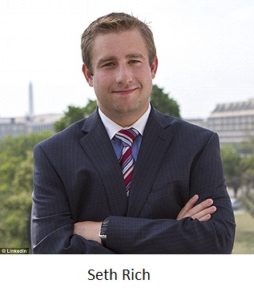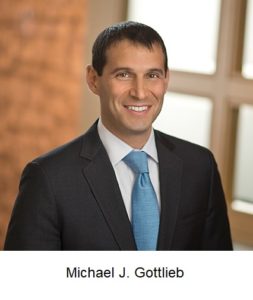 It’s time to call somebody’s bluff.
It’s time to call somebody’s bluff.
On May 30, 2018, I asked lawyers representing Aaron Rich to authorize Wikileaks, Julian Assange, and Kim Dotcom to reveal what they know about payments to Mr. Rich or his brother, murdered Democratic National Committee employee Seth Rich. Those lawyers have been stonewalling ever since.
As you may recall, Mr. Rich sued my client, Ed Butowsky, as well as The Washington Times, America First Media, and Matt Couch, in D.C. federal court on March 26, 2018, claiming they defamed him with allegations that he and his brother orchestrated leaks from the DNC to Wikileaks in exchange for cash.
It seemed obvious to me that the fastest way to resolve the dispute was to authorize the people in the best position to know to tell what they know, hence my request that Mr. Rich authorize Wikileaks, et al. to speak freely. Apparently that idea struck a nerve.
On Friday evening, The Gateway Pundit, LawAndCrime.com, and Worldnetdaily broke the news that Mr. Rich’s lawyers had subpoenaed the Twitter records – including direct messages – of a number of right-leaning publications and authors. To the gullible masses, it might seem like Mr. Rich’s attorneys are aggressively trying to find the truth. In reality, it is the exact opposite: Mr. Rich’s attorneys are trying to intimidate anyone who asks inconvenient questions.
Like me, for example. My personal Twitter account was one of those covered by the subpoena. In other words, Mr. Rich’s lawyers tried to get the private communications of their opposing counsel by serving a subpoena on Twitter.
SMOKE AND MIRRORS
Mr. Rich’s primary attorneys are partner Michael J. Gottlieb and associate Meryl Governski of Boies Schiller Flexner, LLP, a left-wing law firm headquartered in Washington, D.C. Mr. Gottlieb served as associate counsel to President  Obama, and Ms. Gottlieb is a former public relations flack for CNN. Here’s the message that I first sent to Ms. Governski on May 30, 2018 at 3:14 p.m.:
Obama, and Ms. Gottlieb is a former public relations flack for CNN. Here’s the message that I first sent to Ms. Governski on May 30, 2018 at 3:14 p.m.:
I’ve attached a preservation letter that I sent to eBay and PayPal, and I have also attached a proposed waiver for your client. Julian Assange / Wikileaks likely will not cooperate unless your client consents to the release of information. Please let me know if he is willing to consent. Thanks.
Ms. Governski responded at 4:27 p.m.:
We believe the appropriate mechanism for obtaining information from third parties is to serve subpoenas to those third parties as contemplated under the Federal Rules of Civil Procedure. Those rules do not require any advance waiver from any party in order to serve or enforce such a subpoena. If any third party has a request to make of our client as a result of a subpoena, we will address those requests directly with those third parties rather than through opposing counsel.
At 8:12 p.m. I replied as follows:
Yes, but as a practical matter, Julian Assange, Kim Dotcom, and Wikileaks are beyond U.S. jurisdiction. Furthermore, Assange and Wikileaks have shown that they will not be coerced into revealing the identity of their sources. It is for that reason that I am asking your client to voluntarily waive any objections to the release of such information. If you are saying your client is unwilling to do that, I think the media (and the public) will find that very interesting.
Ms. Governski did not respond, so I sent a letter via fax and email at 7:51 a.m. on June 1, 2018 to her, Mr. Gottlieb, and a third lawyer at the firm, Randall Jackson:
I write concerning your client’s pleadings in the case identified above. According to Fed. R. Civ. P. 11(b), an attorney’s signature on the pleadings is certification that he or she has performed “an inquiry reasonable under the circumstances” to determine the accuracy and propriety of those pleadings.
As you know, Ms. Governski and I have exchanged emails about whether your client, Aaron Rich, is willing to voluntarily authorize Wikileaks, Julian Assange, and/or Kim Dotcom to discuss any relationship that they may have had with Mr. Rich or his brother, Seth Rich. Thus far, it appears that your client is unwilling to authorize such disclosures.
This is very telling. On the one hand, Mr. Rich boldly denies that he and/or his brother leaked DNC emails to Wikileaks. On the other, he refuses to authorize disclosures from the witnesses who are in the best position to know who leaked those emails. That begs a question: if your client has nothing to hide, why is he hiding it?
Under Rule 11(b), you have a duty to answer that question. Furthermore, you should ask your client some pointed questions about what funds may have been transferred to him or his brother through eBay accounts. And you should remind him that every trip to a safe deposit box is recorded on video and preserved.
If the evidence leads where we expect it to lead, my client will aggressively seek sanctions against Mr. Rich and everyone else responsible for bringing meritless claims. Thank you for your attention to this matter.
At 3:20 p.m. that afternoon, I received an email notifying me that Mr. Rich’s attorneys were serving a subpoena for Twitter records, including my Twitter records. As of that date, they knew that I was representing Mr. Butowsky because I had previously filed a motion to appear on his behalf pro hac vice (and without any objection from Mr. Rich or his attorneys). At 9:32 a.m. the following morning – a Saturday morning – Mr. Gottlieb personally emailed me a five-page rant, apparently hoping to scare me off (hint: it didn’t work).
Mr. Gottlieb defended himself and his colleagues against my purported suggestion that they had “engaged in fraud upon the court,” further claiming that he would be issuing subpoenas to Wikileaks, Mr. Assange, and Mr. Dotcom. He also indicated that I would be violating the rules of the legal profession if I publicly disclosed the fact that Mr. Rich was unwilling to authorize Wikileaks, et al. to release information. On June 5, 2018, I responded by letter noting that I had never “suggested” that Mr. Gottlieb or his colleagues were involved in a fraud upon the court:
At most, I assumed that you might not be aware of certain background information, and all of my correspondence reflects that. Your overreaction to my letter might lead reasonable people to wonder if you have a guilty conscience…
 We both know that it will be nigh impossible to serve a subpoena on Wikileaks or Mr. Assange, who was granted asylum in the Ecuadorian embassy in London. I would hope that Wikileaks would construe any such subpoena as an implied waiver of confidentiality with respect to your client, but it would be far simpler and more straightforward to authorize Wikileaks to release that information directly.
We both know that it will be nigh impossible to serve a subpoena on Wikileaks or Mr. Assange, who was granted asylum in the Ecuadorian embassy in London. I would hope that Wikileaks would construe any such subpoena as an implied waiver of confidentiality with respect to your client, but it would be far simpler and more straightforward to authorize Wikileaks to release that information directly.
With regard to Seth Rich, I am well aware that a dead person cannot assert defamation claims. His estate, on the other hand, might, have standing to enforce any confidentiality agreements that he made with Wikileaks, and therein lies my concern. Your client is the legal representative of Seth’s estate, which is why I have asked him to waive any such confidentiality agreements. Relatedly, I request that your client consent to unsealing the probate court records for his brother’s estate [Why would an executor ask the probate court to seal the entire record of a childless, unmarried 26-year-old decedent with minimal assets?]. At some point we will need to determine whether funds from Wikileaks were routed through that estate.
Mr. Gottlieb never responded to that letter. On June 7, 2018, I emailed Mr. Gottlieb asking when he planned to issue the subpoenas for Wikileaks, Julian Assange, and Kim Dotcom. He has not responded, and I doubt that he will respond.
Remember, we’re dealing with a former Obama White House lawyer and a former CNN flack, both of whom appear to be well-versed in the dark art of spinning a story. Among the Twitter accounts covered by the June 1, 2018 subpoena is the one belonging to Wikileaks, thus Mr. Gottlieb and Ms. Governski tried to create the appearance that they want to release relevant information about Wikileaks.
Don’t believe it for a minute. For starters, the June 1, 2018 subpoena is frivolous and unenforceable. Shortly after the subpoena was made public, attorney Robert Barnes tweeted out a 2008 federal case holding that civil subpoenas cannot be used to seize communications from third-party servers. See In re Subpoena Duces Tecum to AOL, LLC, 550 F. Supp. 2d 606 (E.D. Va.). It’s not even a close question:
The Stored Communications Act (“SCA”) unambiguously states that the contents of electronically stored communications shall not be disclosed to parties unless an enumerated exception applies. 18 U.S.C. § 2702. A civil subpoena is not an exception. See In re Facebook, Inc., 923 F.Supp.2d 1204, 1206 (N.D.Cal.2012) (“The case law confirms that civil subpoenas may not compel production of records from providers like Facebook.”); Viacom Intern. Inc. v. Youtube Inc., 253 F.R.D. 256, 264 (S.D.N.Y.2008) (“[SCA] § 2702 contains no exception for disclosure of [private videos and the data which reveal their contents] pursuant to civil discovery requests.”); In re Subpoena Duces Tecum to AOL, LLC, 550 F.Supp.2d 606, 611 (E.D.Va.2008) (“… the statutory language of the [SCA] does not include an exception for the disclosure of electronic communications pursuant to civil discovery subpoenas.”).
Finkle v. Howard Cty., Md., No. CIV. SAG-13-3236, 2014 WL 6835628, at *2 (D. Md. Dec. 2, 2014), aff’d sub nom. Finkle v. Howard Cty., 640 F. App’x 245 (4th Cir. 2016).
Furthermore, there are other (and much better) ways to communicate securely than by private Twitter message, a fact that would have been known both to Wikileaks and to Seth Rich, who was an IT professional. Aaron Rich probably knows already that neither he nor his brother sent any messages to Wikileaks via Twitter, thus it is safe for his lawyers to pretend that they are trying to reveal the truth about Wikileaks by serving an unenforceable subpoena for its private messages. At the same time, Mr. Rich refuses to authorize Wikileaks itself to release information transmitted by other methods, e.g., Protonmail or Signal. I guess they assumed that a hayseed like me wouldn’t recognize the head fake.
 By 1:45 p.m. on Sunday afternoon, I received a notice from Joshua Riley, another partner at Boies Schiller, that Mr. Rich was withdrawing his June 1, 2018 subpoena. Frankly, I was a little disappointed, because I had almost finished drafting a ferocious motion to quash the subpoena and sanction the attorneys who issued it.
By 1:45 p.m. on Sunday afternoon, I received a notice from Joshua Riley, another partner at Boies Schiller, that Mr. Rich was withdrawing his June 1, 2018 subpoena. Frankly, I was a little disappointed, because I had almost finished drafting a ferocious motion to quash the subpoena and sanction the attorneys who issued it.
According to Mr. Riley, his firm intends to issue a revised subpoena, so allow me to issue this unrevised warning to the Boies Schiller firm: if you creeps pull another stupid stunt like trying to subpoena my private messages, I’m asking for sanctions. Your boy Robert Mueller may have succeeded in seizing Michael Cohen’s records, but I am not Michael Cohen, I have not done anything unethical or illegal, and I doubt most judges would tolerate oily shysters who harass opposing counsel with frivolous subpoenas.
WHAT IS AARON RICH’S CASE REALLY ABOUT?
I’m not the first to wonder how the Rich family is paying $1,000-per-hour law firms to carry out their litigation campaign. According to my client, he agreed to pay for a private investigator in 2016 because the family said it could not afford to hire one. So where is all the money coming from now?
The first possibility is that the firms took these cases on a contingency basis. As a general rule, Republicans and conservatives don’t know how to play offense, either politically or legally, so maybe Boies Schiller thought it could bully and intimidate the defendants into a quick settlement. As it happens, one of the attorneys representing The Washington Times told me last week that the company is already negotiating a settlement with Aaron Rich (I encouraged the Times lawyer to stand firm at least until we get to the evidence).
Another source told me that the Times’s tentative settlement amount is $100,000. For a firm like Boies Schiller, that’s chump change and not worth the time, but it virtually guarantees that the Times will no longer cover the Seth Rich story, just like Fox News no longer covers the story. (It’s amazing what a frivolous lawsuit can accomplish).
Then there’s the lawsuit that Seth Rich’s parents filed against my client for defamation and intentional infliction of emotional distress. Lawyers across the political spectrum consider that lawsuit frivolous, so there’s virtually no chance that a law firm would have taken that case on a contingency.
That leaves one other possibility: the Rich family’s litigation campaign is being bankrolled by a third party or third parties. I believe that explanation is far more plausible, but it begs another question: why would someone want to fund these lawsuits?
Perhaps because the Democratic establishment is trying to muddy the waters. After all, major Democratic donors kept funding Christopher Steele’s “investigation” after it was publicly exposed and discredited. And the Democratic National Committee sued President Trump for purportedly colluding with Russia, even as the whole Russiagate story was unraveling and even though the DNC knew the lawsuit would permit Republicans to examine the DNC’s computer servers (i.e., the ones that the DNC would not allow even the FBI to examine).
We also know that Obama’s henchmen used the full force of the federal government to caricaturize Carter Page as a Russian spy, and we recently learned (1) that the Obama Administration targeted the Trump campaign as far back as 2015 and (2) British intelligence assisted American intelligence in targeting the Trump campaign.
What does that have to do with Seth Rich? Last week a retired CIA officer shared a very plausible theory with me. First, we can safely assume that American and British intelligence were monitoring Julian Assange and Wikileaks. If Seth Rich was sending DNC records to Wikileaks, the intelligence services probably would have figured that out.
So let’s say the Obama Administration learned that (1) leaked emails would soon be published, and (2) they would be very damaging to Hillary Clinton, Debbie Wasserman-Schultz, and the DNC. What to do? Blame the Russians. If the Obama Administration was willing to frame Carter Page, then it would have no qualms about pointing fingers at Russia.
Remember, Seth Rich was a Bernie Sanders supporter. How bad would it look if a DNC employee aired his party’s dirty laundry because he was appalled by the way that the DNC rigged the primaries in favor of Hillary? No, it would be much more expedient for the Democrats to muddy the waters by declaring themselves the victims of international espionage, particularly if they could accuse their opponent of colluding with the foreign spies.
Finally, here’s another hypothetical to consider. Suppose I got a tip from London that Wikileaks could discretely transfer cash to Seth Rich by arranging a dummy sale on eBay, e.g., paying $50,000 to a sham merchant account for a non-existent product. Would that explain why Boies Schiller wants my private communications? Because they want to figure out who my sources are?
Good luck serving a subpoena on my email server in Switzerland.
DON’T BE A KOOK
Some of my friends have warned me to stay away from the Seth Rich case because it’s too fringe, and because it will damage my credibility. I think that’s exactly what Michael Gottlieb and his ilk are trying to achieve, namely to gaslight anyone who questions the official narrative. Remember, I didn’t start blogging about Seth Rich until the FBI and the Justice Department stonewalled my requests for information (BTW, a hearing on my FOIA lawsuit is scheduled for June 20, 2018 in Brooklyn).
And it’s not just right-wingers who are asking questions. One of the Twitter accounts subpoenaed by Boies Schiller belongs to Jared Beck, an attorney who, like me, has been involved in litigation related to Seth Rich. Jared was an ardent Bernie Sanders supporter and he is a harsh critic of President Trump, proving that you don’t have to be a Trump supporter to question the official narrative, and you don’t have to be a Republican to fear the deep state.
06/11/2018